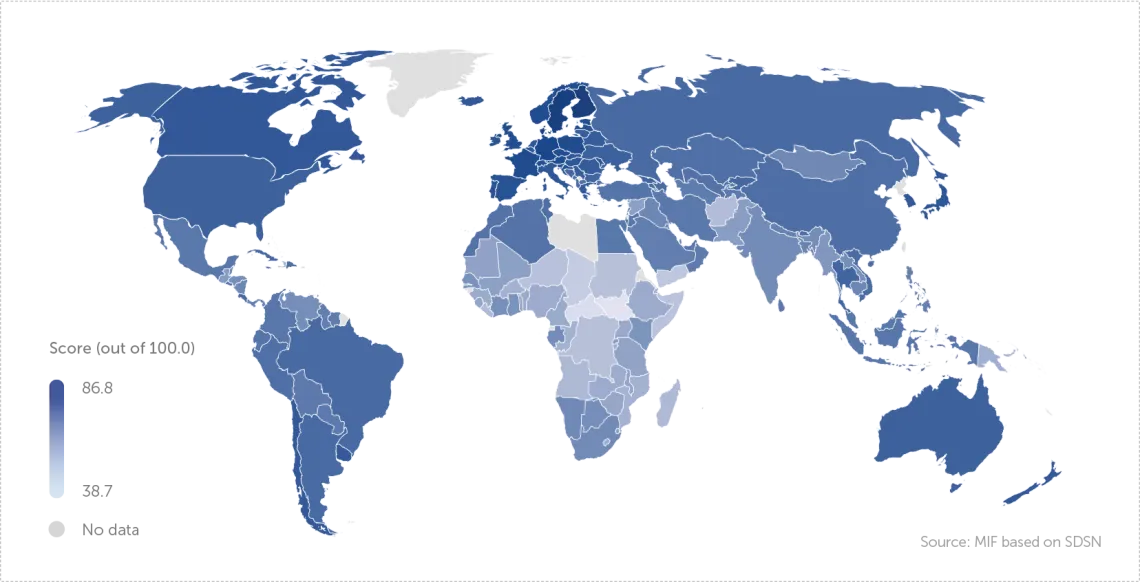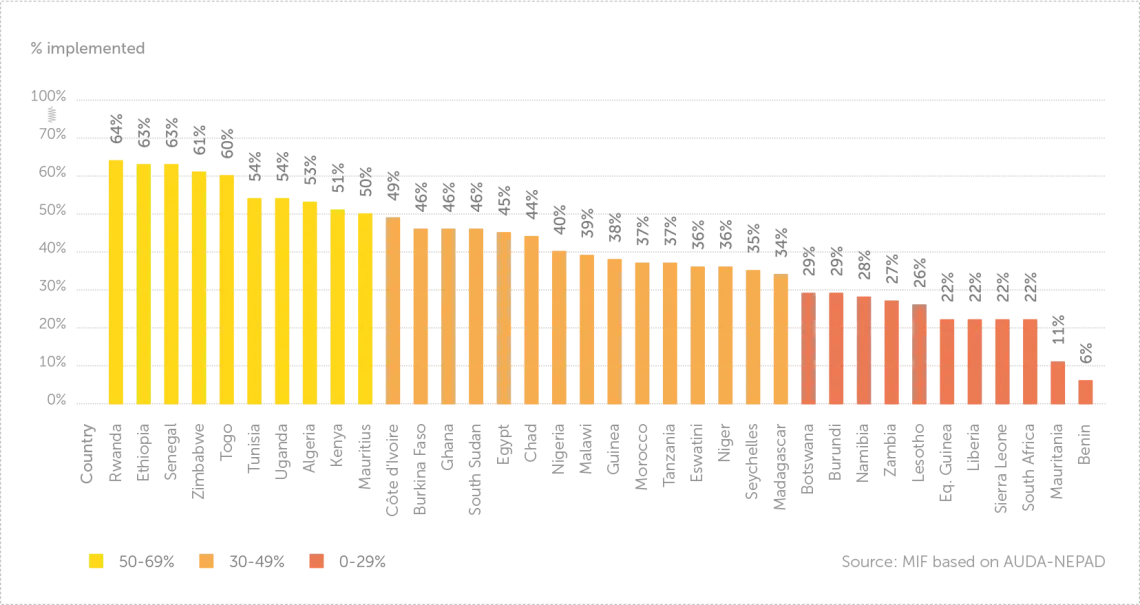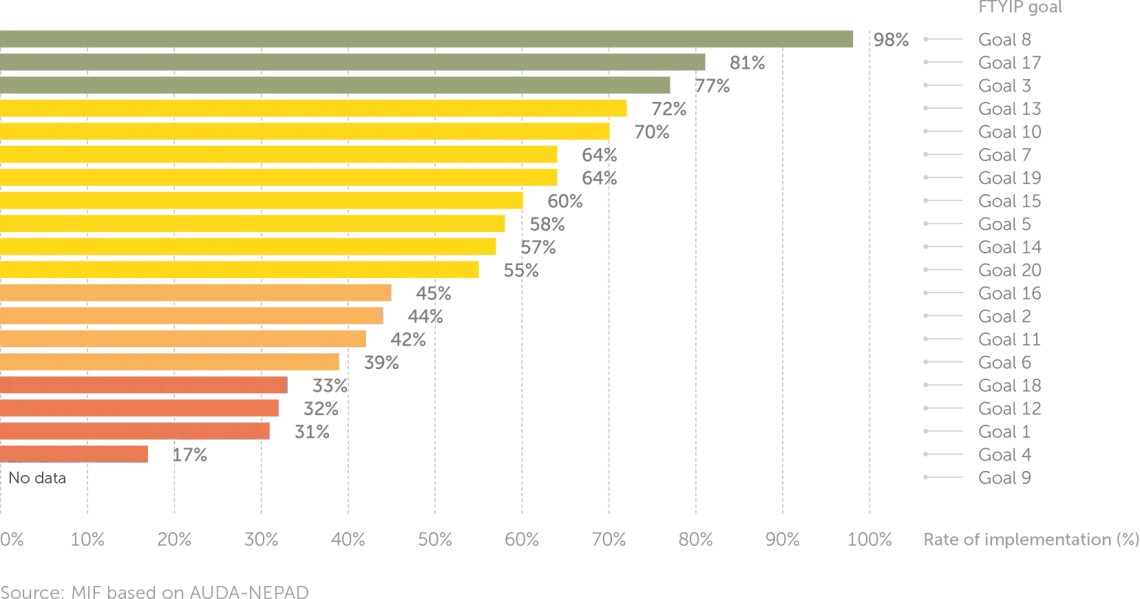Assessing progress against the UN's SDGs and AU's Agenda 2063
06 February, 2025
The UN's SDGs: where do we stand two-thirds through to 2030?
In 2015, building on the Millenium Development Goals (MDGs), the UN adopted Agenda 2030 and laid out the roadmap for its implementation based on 17 SDGs over a 15-year time period.

World countries: SDG Index overall score (2023)
Two thirds of the way to 2030, more progress is needed for Africa to reach the SDG deadline
According to the 2023 Sustainable Development Report, only six of the 17 SDGs have been met by at least one African country.
Of these six, the two best performing SDGs are climate-related: SDG 13 Climate Action and SDG 12 Responsible Consumption and Production, with 34 and 30 out of 54 countries already achieving them respectively.
- SDG 13 Climate Action: 34 countries achieved
- SDG 12 Responsible Consumption and Production: 30 countries achieved
The remaining four SDGs have already been met by at least one country:
- SDG 1 No Poverty: Algeria, Mauritius, Tunisia
- SDG 4 Quality Education: Seychelles
- SDG 5 Gender Equality: Namibia
- SDG 10 Reduced Inequalities: Algeria
18 countries in sub-Saharan Africa are, on average, less than halfway towards meeting the expected outcomes on all SDGs.
"At our current rates, we estimate some 600 million people will still be living in extreme poverty beyond 2030. Finance is the crux of the problem."
~H.E. Amina J. Mohammed, Deputy Secretary-General, United Nations
However, crucial development-related SDGs have not been met by any country, with most facing major challenges.
- SDG 2 No Hunger and SDG 3 Good Health and Well-being: 50 out of 54 countries are classified as 'facing major challenges', and the remaining 4 countries are classified as 'facing significant challenges'.
- Despite this, few other countries outside of Africa are performing any better. It is not just African countries that are failing to reach SDG 2, with both the UK and the US classed as 'facing major challenges'.
- Further, the lack of intersectionality within the SDG methodology means that the data presents interesting challenges. For example, countries like Algeria which have achieved SDG 1 No Poverty are still facing major challenges in SDG 2 No Hunger.
Is progress towards development-related SDGs ruling out progress in climate-related SDGs?
The performance of each African country across the 17 SDGs highlights the complex relationship between development and climate goals on the continent. Countries with lower levels of economic development produce lower emissions and therefore register a good performance in climate-related SDGs. However, as soon as countries progress in their levels of socio-economic development, performance in climate-related indicators drops, indicating the need to better reconcile climate and development goals. This demonstrates the difficulty for any country to achieve all of the SDGs simultaneously.
Indeed, the majority of African countries have already achieved SDG 13 Climate Action, the highest proportion compared to other world regions. These countries simultaneously face major challenges in human or socioeconomic development indicators.
On the other hand, the African countries that have achieved some of the human or socio-economic development indicators are the only ones facing challenges in the climate-related indicators. For instance, Algeria, Tunisia and Mauritius are the only African countries to have achieved SDG 1 No Poverty. However, they are all classified as facing challenges in SDGs 12 and 13.
This trend also occurs in other world regions: while most African countries have achieved SDG 13 Climate Action, no EU country, nor the US or Canada have done so. Almost 90% of EU and North American countries are facing major challenges in achieving SDG 13 and none are on track for achievement. At the same time, these regions are scoring among the highest when it comes to socio-economic development indicators.
The AU's Agenda 2063: assessing the first decade of progress (2014-2023)
The AU Agenda 2063 is the continent’s strategic framework for transforming Africa from 2013 to 2063. It is organised around seven aspirations and 20 goals.
Agenda 2063 is divided into five Ten-Year Implementation Plans. The First Ten Year Implementation Plan (FTYIP) covered 2014-2023. In 2022, NEPAD produced the first assessment of the FTYIP presented at the February 2024 AU Summit.
AU's Agenda 2063: 20 goals
| 1 A high standard of living, quality of life and well being for all citizens | 11 Democratic values, practices, universal principles of human rights, justice and the rule of law entrenched |
| 2 Well educated citizens and skills revolution underpinned by science, technology and innovation | 12 Capable institutions and transformative leadership in place |
| 3 Healthy and well-nourished citizens | 13 Peace, security and stability is preserved |
| 4 Transformed economies and job creation | 14 A stable and peaceful Africa |
| 5 Modern agriculture for increased productivity and production | 15 A fully functional and operational APSA |
| 6 Blue / ocean economy for accelerated economic growth | 16 African cultural renaissance is pre-eminent |
| 7 Environmentally sustainable and climate resilient economies and communities | 17 Full gender equality in all spheres of life |
| 8 United Africa (federal or confederate) | 18 Engaged and empowered youth and children |
| 9 Key continental financial and monetary institutions are established and functional | 19 Africa as a major partner in global affairs and peaceful co-existence |
| 10 World class infrastructure criss-crosses Africa | 20 Africa takes full responsibility for financing her development |
Source: MIF based on AU

Selected African countries: Agenda 2063 FTYIP implementation progress (2022)
At the end of the FTYIP, at country level, only ten countries have been able to implement 50% or more of their goals, representing 23.8% of Africa's population in 2022: Rwanda (64%), Ethiopia (63%), Senegal (63%), Zimbabwe (61%), Togo (60%), Tunisia (54%), Uganda (54%), Algeria (53%), Kenya (51%) and Mauritius (50%).
At the other end, 11 countries have an implementation rate of 30% or less, representing 9.4% of Africa's population in 2022: Botswana (29%), Burundi (29%), Namibia (28%), Zambia (27%), Lesotho (26%), Equatorial Guinea (22%), Liberia (22%), Sierra Leone (22%), South Africa (22%), Mauritania (11%) and Benin (6%).
At goal level, only five out of the 20 goals are assessed as being more than 70% implemented: Goal 3 Healthy and well-nourished citizens, Goal 8 United Africa (federal or confederate), Goal 10 World class infrastructure crisscrosses Africa, Goal 13 Peace, security and stability is preserved, and Goal 17 Full gender equality in all spheres of life.
Crucially, Goal 4 Transformed economies and job creation is assessed as only being 17% implemented, the worst performing goal out of the 20. This is critical, considering the key areas of this goal measure focus points for the continent’s economic progress: sustainable and inclusive economic growth; manufacturing, industrialisation and value addition driven by Science, Technology and Innovation (STI); economic diversification and resilience; as well as hospitality/tourism.
Only 5 countries achieved 60% or more of Agenda 2063 first decade goals (FTYIP): Rwanda (64%), Ethiopia (63%), Senegal (63%), Zimbabwe (61%), Togo (60%).
11 African countries have not submitted any progress reports for Agenda 2063 first decade goals (FTYIP): (2014-2023).

Africa: Agenda 2063 FTYIP implementation progress by goal (2022)
The three best performing Agenda 2063 goals are Goal 8 United Africa (federal or confederate), Goal 17 Full gender equality in all spheres of life, and Goal 3 Healthy and well-nourished citizens.
The three worst performing Agenda 2063 goals are Goal 4 Transformed economies, Goal 1 A high standard of living, quality of life and well being for all citizens, Goal 12 Capable institutions and transformative leadership in place.
The Second Ten-Year Implementation Plan (STYIP)
In February 2024, the AU launched the Second Ten-Year Implementation Plan (STYIP) at the AU Summit, built around seven 'moonshot' targets to be achieved over the next 10 years from 2024 to 2033 (the 'Decade of Acceleration').
The targets, inspired by the aspirations of Agenda 2063, are as follows:
| Moonshot | Objective | Goals |
|---|---|---|
| 1 | Every AU Member State attains at least middle-income status. | The focus will be on creating wealth, with an overall target of GDP per capita $3,048 achieved by each AU Member State. Key interventions will include industrialisation and value addition, boosting agriculture productivity and production and strengthening governance at all levels. |
| 2 | Africa is more integrated and connected. | The focus will be on infrastructure development and energy security, trade in goods and services and on connectivity, including internet access, IT, AI, road and air transport, among others. |
| 3 | Public institutions are more responsive. | This will include: placing a premium on respect for the rule of law, nurturing transformative leadership and building/strengthening responsive democracy over the next decade. |
| 4 | Africa resolves conflicts amicably. | This will entail strengthening surveillance and early warning mechanisms at all levels, strengthening social cohesion and respect for diversity and enhancing mechanisms for peaceful conflict resolution. |
| 5 | African culture and values are explicit and promoted. | The continent will articulate Africa's values and promote all development on African values. |
| 6 | African citizens are more empowered and more productive. | The continent will make deliberate efforts to transform education and health systems, enhance social protection measures, and equip its citizens with the requisite skills and resources to be able to drive Africa’s development. |
| 7 | Africa is a strong and influential global player. | The continent will be intentional about Africa’s representation at strategic global platforms, build African Common Positions on pertinent global matters, and play an active role in the governance of international institutions. |
Source: MIF


